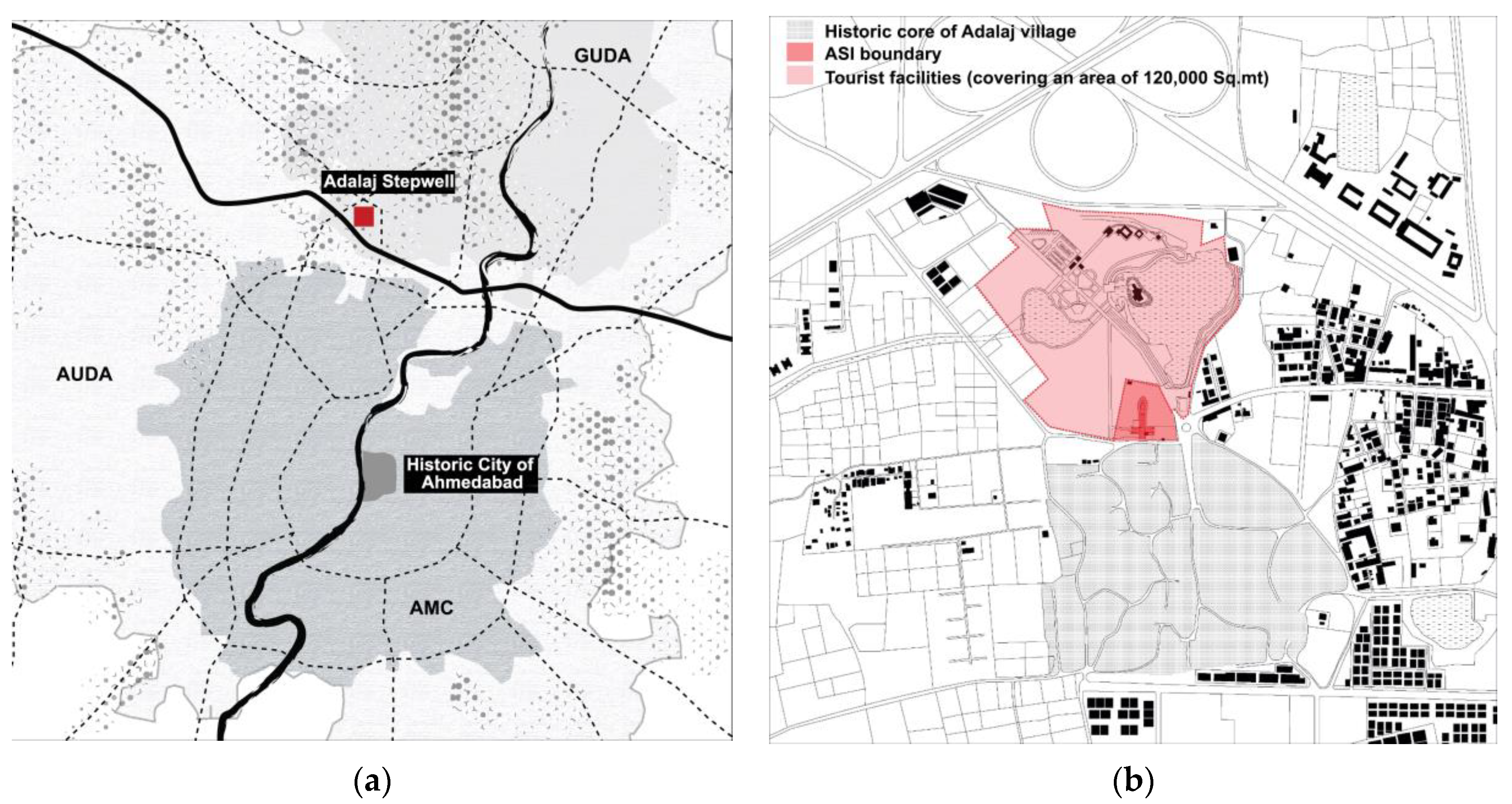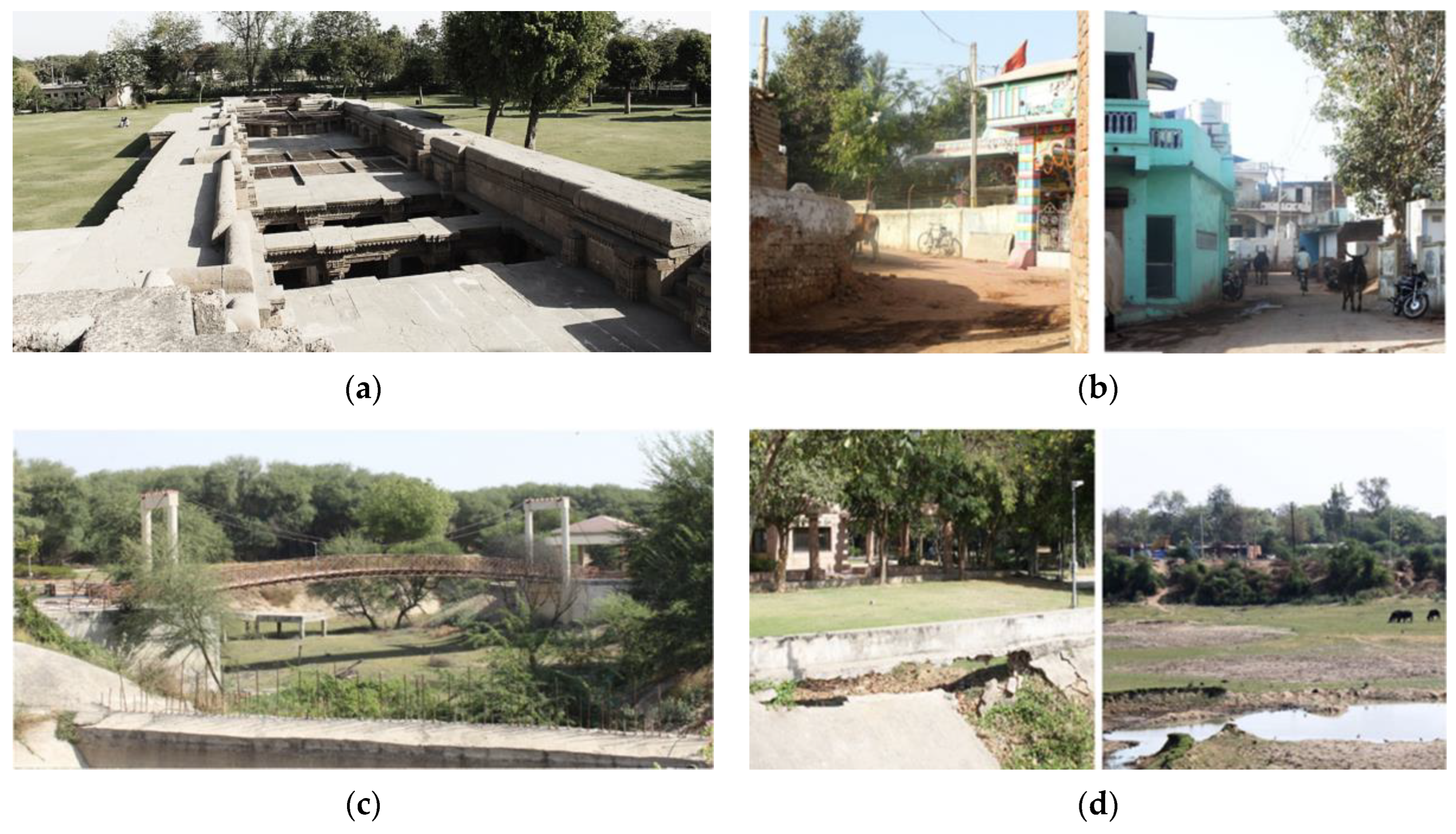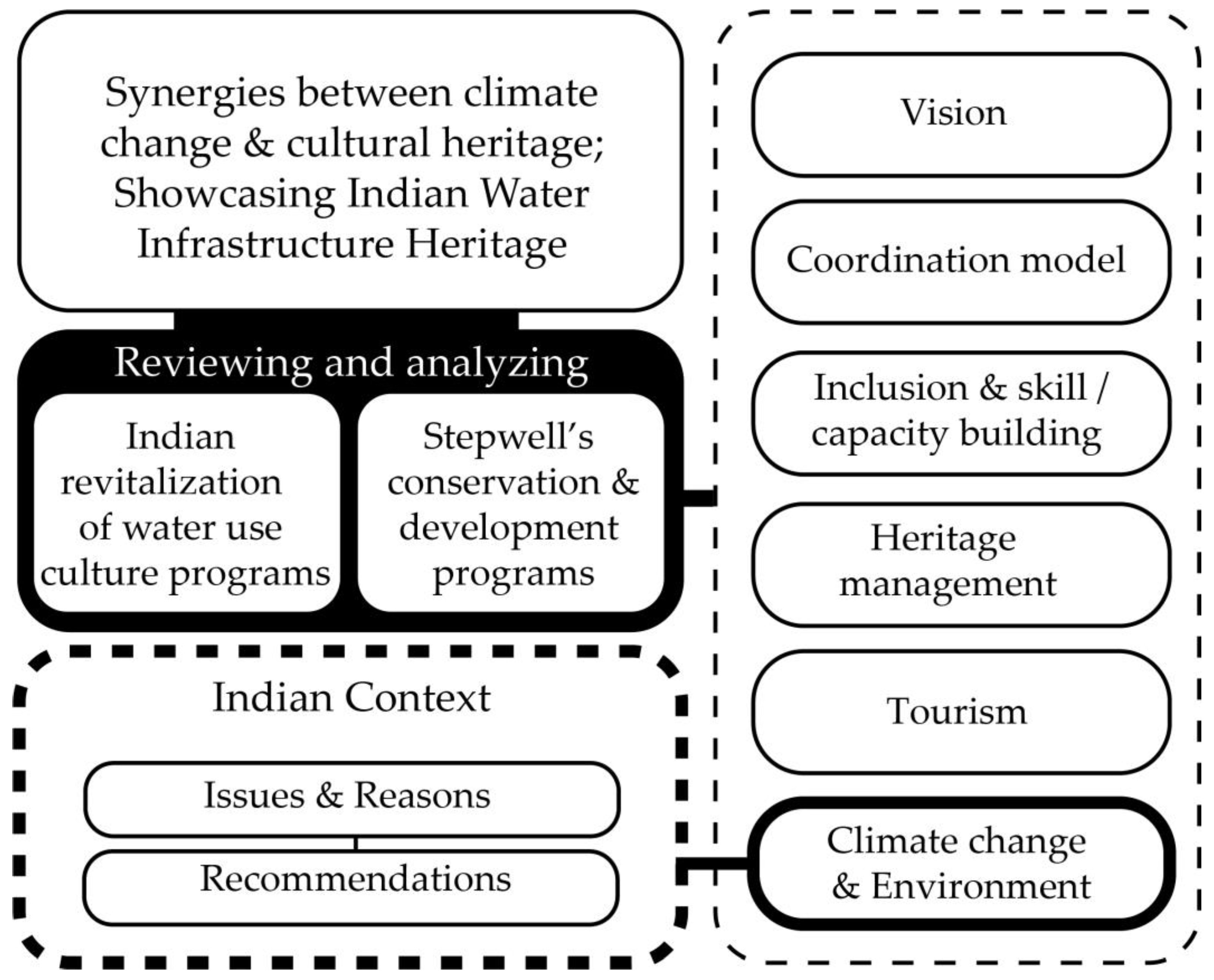Towards a Regenerative Role of Cultural Heritage in Climate Resilience; the Case of the Indian Water Infrastructure Heritage
Abstract
1. Introduction
2. Research Methodology
3. Indian Revitalization of Water Management/Water Use Culture
3.1. National Level
3.2. State and Local Levels
4. Rudabai Stepwell Conservation and Development Programs



5. Discussion
5.1. Issues Regarding Climate Change Challenges in India
| Category of Issues | Main Issues | Main Reasons |
|---|---|---|
| Planning and management | Insufficient adaptation of SDG11 in a comprehensive way in India; Scarcity of heritage regulations; Lack of proper implementation of existing heritage regulations; Failure to implement the NPC—AMASR by ASI; One-dimensional concentration on preservation of water bodies for flood prevention; Lack of profitability of the investment in physical tourist facilities; Lack of daily integration of local activities with the maintenance program of tourist facilities. | Lack of recognition of systemic synergies among conservation, sustainability, and development in facing climate change in practice; Profit-oriented tourism destination management models, with a tendency toward traditional interpretation of sustainable development concept; Concentration on designing the deterministic development plans, with no priority for appropriate heritage protection, conservation, and management; Concentration of national/regional/urban smart development and tourism programs on physical planning, with top-down/centralized actions. |
| Institutional | Absent of culture/cultural heritage in Indian National Action Plan on Climate Change (NAPCC); Lack of integration of climate action concerns into heritage management processes, conservation practices and heritage decision-making; Lack of dialogue and collaboration between the heritage/culture and climate science fields. | Lack of comprehensive vision/commitment to climate changes issues for cultural heritage; Insufficient recognition of the cultural dimension of climate change/cultural understanding of risks on resources by actors such as policy-makers; Lack of understanding/awareness of (climate-related) risks/their impacts on cultural heritage; Lack of skills, knowledge, and competencies in the heritage field to cope with climate change issues. |
| Technical | Significant lack of information and analysis on current/projected impacts of climate change on. cultural heritage/WIH; Lack of effective data collection mechanisms for climate/environmental change impact on WIH; Lack of (climate-related) risks and losses methodologies reinforcing decision making. | Uneven and marginalized initiatives of Indian revitalization of water management vs. Prioritized centralized smart development programs; Lack of skills, knowledge, and competencies in the heritage field to collect data and information; Lack of even distribution and properly use of modern techniques and knowledge on documentation and surveys across India. |
| Socio-Cultural | Insufficient awareness of climate change adaptation and mitigation, risk, vulnerability, and resilience regarding cultural heritage/WIH; Insufficient valuable and easily accessible climate knowledge platforms; Lack of engagement of local and Indigenous communities, and their traditional knowledge. | Concentration on physical planning/policy with short-term political benefits, excluding local communities’ needs, capabilities, and involvements. |
| Financial | Significant lack of funds and poor public and private-sector investment on the climate-related issues on cultural heritage/culture. | Priority on short-term political benefits; Absent of culture/cultural heritage in the national/regional plans dealing with climate change. |
5.2. Recommendations for Climate Change and Heritage Synergies in India
5.2.1. Vision and Commitment; Collaborations and Actions
5.2.2. Bridging Knowledge Gaps
6. Conclusions and Reflections
Funding
Institutional Review Board Statement
Informed Consent Statement
Data Availability Statement
Acknowledgments
Conflicts of Interest
References
- IPCC. Summary for Policymakers. In Global Warming of 1.5 °C, An IPCC Special Report on the Impacts of Global Warming of 1.5 °C above Pre-Industrial Levels and Related Global Greenhouse Gas Emission Pathways, in the Context of Strengthening the Global Response to the Threat of Climate Change, Sustainable Development, and Efforts to Eradicate Poverty; Masson-Delmotte, V., Zhai, P., Pörtner, H.-O., Roberts, D., Skea, J., Shukla, P.R., Pirani, A., Moufouma-Okia, W., Péan, C., Pidcock, R., et al., Eds.; Cambridge University Press: Cambridge, UK; New York, NY, USA, 2018. [Google Scholar]
- IPCC. Summary for Policymakers. In Climate Change 2022: Impacts, Adaptation, and Vulnerability. Contribution of Working Group II to the Sixth Assessment Report of the Intergovernmental Panel on Climate Change; Pörtner, H.-O., Roberts, D.C., Tignor, M., Poloczanska, E.S., Mintenbeck, K., Alegría, A., Craig, M., Langsdorf, S., Löschke, S., Möller, V., et al., Eds.; Cambridge University Press: Cambridge, UK; New York, NY, USA, 2022. [Google Scholar]
- Krishnan, R.; Sanjay, J.; Gnanaseelan, C.; Mujumdar, M.; Kulkarni, A.; Chakraborty, S. (Eds.) Assessment of Climate Change over the Indian Region; Springer: Singapore, 2022. [Google Scholar]
- Asoka, A.; Gleeson, T.; Wada, Y.; Mishra, V. Relative contribution of monsoon precipitation and pumping to changes in groundwater storage in India. Nat. Geosci. 2017, 10, 109–117. [Google Scholar] [CrossRef]
- Hein, C.; Van Schaik, H.; Six, D.; Mager, T.; Kolen, J.; Ertsen, M.; Nijhuis, S.; Verschuure-Stuip, G. Introduction: Connecting Water and Heritage for the Future. In Adaptive Strategies for Water Heritage, Past, Present and Future; Hein, C., Ed.; Springer Open: London, UK, 2020. [Google Scholar]
- ICOMOS Water and Heritage. Available online: https://water.icomos.org/ (accessed on 20 June 2023).
- The 2023 UN Conference Was Organized to Urgently Call for Action Stated in the Dushanbe Declaration of 2022, ‘Water for Sustainable Development’: The Need to Accelerate “Our Efforts for Coherent Implementation of Water-Related Goals and Achievement of Targets of the 2030 Agenda and Aim at Strengthening Political and Technical Dialogue on Water, Including at the Highest Level.” It Is Worth Noting That Thanks to Recommendations of the International Symposium on Water and Culture in Tokyo 2020, ‘Culture and Heritage’ Entered the Agenda of the UN 2023 Water Conference. Available online: https://dushanbewaterprocess.org/wp-content/uploads/2022/06/2022-final-declaration-final-draft-0608-en-final-1.pdf (accessed on 20 June 2023).
- Statement on Water, Culture and Heritage, by the Participants of the Conference on Water and Heritage: Connecting Past, Present and Future. In Proceedings of the UN 2023 Water Conference, New York, 20 March 2023. Available online: https://www.portcityfutures.nl/uploads/cfpcf/attachments/Statement%20water%20and%20heritage_NYC_20%20March%202023-2_1.pdf (accessed on 20 June 2023).
- Government of Netherlands, Countdown to the UN 2023 Water Conference: Sustainable Water Management in India. Available online: https://www.government.nl/latest/news/2023/03/21/sustainable-water-management-in-india (accessed on 8 July 2023).
- NITI Aayog. Working Group Report on Improving Heritage Management in India; NITI Aayog: New Delhi, India, 2020.
- Alongside the Implementation of Schemes and Programs of NAPCC, in 2022, India Updated Its Nationally Determined Contributions to Tackle Global Climate Challenges. It Submitted a Document titled India’s Long-Term Low Carbon Development Strategy to the UNFCCC to Achieve Net Zero by 2070; Ministry of Environment, Forest and Climate Change: New Delhi, India, 2022.
- Their Vision Includes “to Improve the Understanding of Water Heritage through Documentation, Research, Outreach, and Advocacy; Strengthen Management and Policy Frameworks to Better Safeguard, Conserve and Manage Water Heritage; and Position Water Heritage as a Source of Learning for the Future through Cross-Sector Collaborations.”. ICOMOS India, WH-WG (Water Heritage Working Group). Available online: https://www.icomosindia.com/group-members/wh-wg--water-heritage-working-group-.html (accessed on 12 March 2022).
- World Monuments Fund. Historic Water Systems of the Deccan Plateau. The Program, Historic Water Systems of India, Built on WMF’s Previous Efforts to Revitalize the Water Systems of the Deccan Plateau, Following Their Inclusion on the 2020 Watch. Available online: https://www.wmf.org/project/historic-water-systems-deccan-plateau (accessed on 12 March 2022).
- Rajabi, M.; Della Torre, S. The New Challenges for Conservation and Management of HUWI, Ahmedabad, India. In Proceedings of the EAAE-ARCC International Conference and 2nd Valencia International Biennial of Research in Architecture, Valencia, Spain, 10–13 June 2020. [Google Scholar]
- Archaeological Survey of India. Nomination Dossier of Rani-Ki-Vav (the Queen’s Stepwell) at Patan; Archaeological Survey of India: Gujarat, India, 2014.
- Baradi, M.; Malhotra, M.; Joshi, M.; Baradi, K. Lesser-Known Stepwells—In and around Ahmedabad-Gandhinagar Region; Urban Management Centre: Ahmedabad, India, 2017. [Google Scholar]
- Government of India; Ministry of Urban Employment and Poverty Alleviation; Ministry of Urban Development. Jawaharlal Nehru National Urban Renewal Mission (JNNURM). 2006. Available online: https://mohua.gov.in/upload/uploadfiles/files/1Mission%20Overview%20English(1).pdf (accessed on 27 July 2019).
- For further information regarding such transformations, see Rajabi, M., Whom and whose cultural heritage? Reflections on the notion of “cultural heritage” in contemporary Indian conservation and planning systems. In Prerequisites for Post-Disaster Regeneration of Historic Cities; Arefian, F.F., Ryser, J., Eds.; Silk Cities Organization: London, UK, 2021. [Google Scholar]
- For Further Information, See AUDA, CEPT University, and Urban Mass Transit Company Ltd & LEA Associates. Integrated Mobility Plan for Greater Ahmedabad Region, Horizon Year 2031, Volume 1-Plan Document. Available online: https://wricitieshub.org/sites/default/files/Integrated%20Mobility%20Plan%20for%20Greater%20Ahmedabad%20Region.pdf (accessed on 27 July 2019).
- Smart Cities Mission. Available online: https://smartcities.gov.in/ (accessed on 8 July 2021).
- Gandhinagar Smart City. Available online: http://gandhinagarmunicipal.com/gandhinagar-smart-city/ (accessed on 2 February 2021).
- NITI Aayog, SDG India Index, Gujarat. Available online: https://sdgindiaindex.niti.gov.in/#/state-compare?goal=AllGoal&area=IND024&timePeriod=2020 (accessed on 10 June 2023).
- Lefèvre, R. Le Patrimoine Culturel dans le Plan National Français d’Adaptationau Changement Climatique. In Cultural Heritage Facing Climate Change: Experiences and Ideas for Resilience and Adaptation; Lefèvre, R.-A., Sabbioni, C., Eds.; Edipuglia: Bari, Italy, 2018. [Google Scholar]
- Chalana, M.; Krishna, A. Heritage Conservation in Postcolonial India: Approaches and Challenges; Routledge: New York, NY, USA, 2021. [Google Scholar]
- Ministry of Urban Development, Government of India. National Mission on Sustainable Habitat: Adaptation and Mitigation Measures in the Field of Water Supply & Sanitation; Ministry of Urban Development, Government of India: New Delhi, India, 2014.
- Leissner, J.; Kilian, R.; Kotova, L.; Jacob, D.; Mikolajewicz, U.; Broström, T.; Ashley-Smith, J.; Schellen, H.L.; Martens, M.; van Schijndel, J.; et al. Climate for Culture: Assessing the impact of climate change on the future indoor climate in historic buildings using simulations. Herit. Sci. 2015, 3, 38. [Google Scholar] [CrossRef]
- Climate for Culture. Available online: https://www.climateforculture.eu/index.php?inhalt=home (accessed on 15 March 2021).
- European Commission. COM (2021) 82 Final, Forging a Climate-Resilient Europe—The New EU Strategy on Adaptation to Climate Change. 2021. Available online: https://eur-lex.europa.eu/legal-content/EN/TXT/PDF/?uri=CELEX:52021DC0082&from=EN (accessed on 11 December 2021).
- ICOMOS CCH-WG. The Future of Our Pasts, Heritage and Climate Change Outline Report; ICOMOS: Paris, France, 2019. [Google Scholar]
- IPCC. Climate Change 2014: Synthesis Report. Contribution of Working Groups I, II and III to the Fifth Assessment Report of the Intergovernmental Panel on Climate Change; Core Writing Team, Pachauri, R.K., Meyer, L.A., Eds.; IPCC: Geneva, Switzerland, 2014. [Google Scholar]
- Avrami, E.C. Spatializing Values in Heritage Conservation: The Potential of Cultural Mapping. In Values in Heritage Management; Avrami, E., Mason, R., Macdonald, S., Myers, D., Eds.; The Getty Conservation Institute: Los Angeles, CA, USA, 2019; pp. 35–49. [Google Scholar]
- Patel, B. In Conversation with B. R Balachandran on the Planning the City for an Unpredictable Future. Available online: https://soundcloud.com/crdfpodcast/b-r-balachandran-in-conversation-with-bimal-patel-keeping-affordability-in-mind (accessed on 12 July 2020).
- Rajabi, M. Notes on the Contemporary Challenges of the Management of World Heritage Properties; Reflection on Rani-Ki-Vav (The Queen’s Stepwell) at Gujarat, India; Restauro Archeologico: Contrada Bagni, Italy, 2022. [Google Scholar]
- UNESCO/WHC; Greece/Greek GEO Office. Urban Heritage Climate Observatory, Strategic Implementation Plan 2020–2022. 2020. Available online: https://earthobservations.org/documents/gwp20_22/UHCO (accessed on 20 January 2022).
- ICOMOS. GA2020/12-6, Agenda Item 6-6-1, Resolution 20GA/15. 2020. Available online: https://www.icomos.org/images/DOCUMENTS/Secretariat/2020/Cultural_Heritage_and_the_Climate_Emergency-Resolution_20GA_15_pdf (accessed on 10 March 2021).
- Throsby, D. Culture, Economics, and Sustainability. J. Cult. Econ. 1995, 19, 199–206. [Google Scholar] [CrossRef]
- Capello, R.; Cerisola, S.; Perucca, G. Cultural Heritage, Creativity, and Local Development: A Scientific Research Program. In Regeneration of the Built Environment from a Circular Economy Perspective; Della Torre, S., Cattaneo, S., Camilla, L., Zanelli, A., Eds.; Springer: Berlin/Heidelberg, Germany, 2020. [Google Scholar]

| Recommendations | |
|---|---|
| Vision and commitment; collaborations and actions | Integrating culture/cultural heritage as a separate sector into the Indian NAPCC; Benefiting from India’s ICOMOS working groups and INTACH in mobilizing the cultural heritage sector for climate action efforts and in successfully implementing existing proactive programs focusing on the revitalization of WIH; Comprehensive research and detailed systemwide information gathering/analysis of the current/projected impacts of climate change on cultural heritage/WIH; Promoting/establishing research for investigating cost-effective strategies for (climate-related) risk reduction on cultural heritage/WIH; Advocating/promoting programs/frameworks for knowledge dissemination, innovation, raising awareness and capacity building on resilient cultural heritage/WIH; Developing pilot projects with the support of international/national, public and private funding institutions, NGOs, universities, and international experts; Recognizing the WIH as climate change observatories and source of the resilience of its local communities against climate change by climate science, heritage, and development-policy makers/practitioners; Recognizing the existing theorized sustainability principles with critical perspective. |
| Bridging knowledge gaps | Benefiting from the new EU Strategy on Adaptation to Climate Change for India; Assessing the impact of climate change on heritage: using mitigation and adaptation strategies and tools of European projects; Integrating the Earth Observation data into daily cultural heritage-related activities; Conducting cultural significance assessment, community impact evaluation and cultural impact assessment alongside other assessments; Integrating effectively and consistently Indigenous/local/traditional knowledge systems in existing adaptation and mitigation processes. |
Disclaimer/Publisher’s Note: The statements, opinions and data contained in all publications are solely those of the individual author(s) and contributor(s) and not of MDPI and/or the editor(s). MDPI and/or the editor(s) disclaim responsibility for any injury to people or property resulting from any ideas, methods, instructions or products referred to in the content. |
© 2023 by the author. Licensee MDPI, Basel, Switzerland. This article is an open access article distributed under the terms and conditions of the Creative Commons Attribution (CC BY) license (https://creativecommons.org/licenses/by/4.0/).
Share and Cite
Rajabi, M. Towards a Regenerative Role of Cultural Heritage in Climate Resilience; the Case of the Indian Water Infrastructure Heritage. Land 2023, 12, 1539. https://doi.org/10.3390/land12081539
Rajabi M. Towards a Regenerative Role of Cultural Heritage in Climate Resilience; the Case of the Indian Water Infrastructure Heritage. Land. 2023; 12(8):1539. https://doi.org/10.3390/land12081539
Chicago/Turabian StyleRajabi, Mehrnaz. 2023. "Towards a Regenerative Role of Cultural Heritage in Climate Resilience; the Case of the Indian Water Infrastructure Heritage" Land 12, no. 8: 1539. https://doi.org/10.3390/land12081539
APA StyleRajabi, M. (2023). Towards a Regenerative Role of Cultural Heritage in Climate Resilience; the Case of the Indian Water Infrastructure Heritage. Land, 12(8), 1539. https://doi.org/10.3390/land12081539








